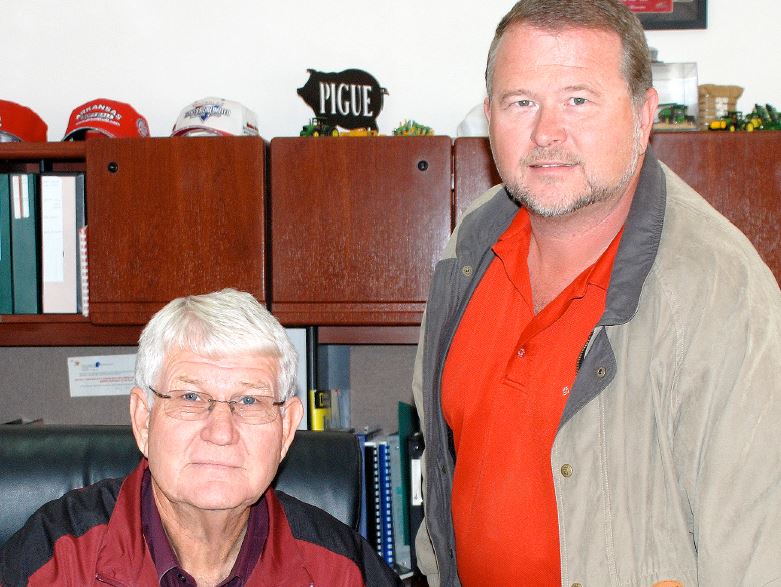Arkansas farmers appreciate tool’s performance across crops and soil types
The business plan at Pigue Farms demands fast, efficient and economical operation and the Kelly Diamond Harrow fits those parameters like a glove.
Ron Pigue and his son, David, are in the business of raising rice, corn and soybeans.
With 5,000 acres of cropland near Paragould, Ark., the Pigues count on the Kelly Diamond Harrow to transition their harvest aftermath to an optimum planting environment — fast, efficiently and economically.
“My neighbor saw a field we’d just worked with the Kelly,” Ron recalls from the first season he used the innovative implement from Kelly
Engineering. “He asked what we’d done — he knew it had been pretty rough before and he said it looked like it had been land-planed. I told him we went over it twice with the Kelly and that was it. Now he owns one, too.”
Pigue Farms bought the first Kelly Diamond Harrow in their community and the next year better than a dozen of the machines were running in the neighborhood. And the number keeps growing.
The Pigues themselves now have two Kelly Diamond Harrows and, for Ron, the reason for their popularity is pretty simple. “It’s the most versatile tool I’ve ever seen,” he observes.
“It’s kind of an unlikely-looking thing but it really, really works well. We thought we’d just use it on the rice ground, in the gumbo, but we just kept using it. Corn, soybean ground, sandy loam, gumbo — it’s an amazing tool.”
After rice harvest, the Pigues run their 45-ft. Kelly Diamond Harrow twice to fluff up the residue for burning. Post-burn, a couple of trips with the Kelly fills the deep ruts that occur in rice fields and provides a fine seedbed for the next crop.
Before they added the Kelly Diamond Harrow to their implement arsenal, the Pigues would disc at least twice and then float the field with a land-plane two more times. “Without the Kelly, you’d double your time just disc-harrowing,” David points out.
“And you’d use about three times as much fuel. That’s doesn’t even figure in the land-planing.
With the Kelly, we’re running a 45-ft. wide implement at about 8 miles per hour and a lesser engine RPM than you would with a disc, a field cultivator or a land-plane because it’s a much easier pull. It’s a lot faster and it save a lot of fuel.”
“And,” he adds. “It does a heckuva job.”
Ron explains that the Kelly Diamond Harrow’s versatility includes the ability to eliminate deep ruts as well as providing a great seedbed. “We use it to get a roughed-up field back into shape and we use it as our final tool before planting,” he says.
“In the spring, if you have a stale seedbed to loosen up, you can quickly work that top inch or so and get those early weeds.
It gives you perfect, uniform residue cover for corn and beans, it fluffs up rice residue so you can get a good burn and you can pull it over bedded ground — it’s got a lot of uses.”
With a lot of acres to cover, the Kelly Diamond Harrow’s ability to get onto wet ground significantly sooner in the spring pays huge dividends.
The chain harrow’s shallow, consistent tillage opens the soil just enough to allow for drying without creating clods —even in thick gumbo soils. The quality of the resulting seedbed, in fact, makes the Kelly especially useful in rice planting where seed placement is shallow and good seed-to-soil contact a must.
David adds that the Kelly Diamond Harrow is a very “green” tool.
“You’re not tilling as deep, you’re evenly distributing the chaff and residue on top of the ground to prevent washing and you’re saving fuel,” he says.
Reliability is another important factor at Pigue Farms. One of their Kelly Diamond Harrows has two years of use, the other has one and both have operated problem-free. “The only thing we do is grease and check the tension,” David says. “That’s it.”
The Kelly Diamond Harrow’s blades are wear-guaranteed for 50,000 acres and the swivel bearings are guaranteed for 10,000 acres. And, the Kelly Diamond Harrow comes with a spare swivel bearing to reduce potential down-time.
It all adds up to a tool that Ron and David Pigue rely on to help them take care of business.
“I wouldn’t want to farm without it,” Ron concludes.


